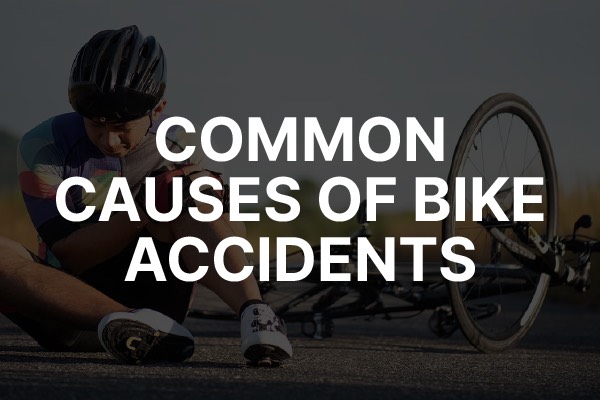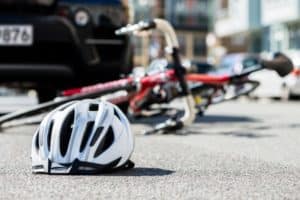
Table of contents
Bicycle accidents in the DFW Metroplex are not uncommon. In fact, Dallas, Tarrant, Collin, and Denton are among the top ten counties in Texas with the highest number of bicycle accidents per year. Unfortunately, with little protection, bicycle accidents that also involve cars often result in serious injury or even death for the bicyclist. It is important to remember to share the road, whether you are a driver of a motorized vehicle or a bicyclist. Knowing the top causes of bicycle accidents can help you make better decisions and keep you and your fellow neighbor safe while on the road.
1. Distracted Driving
The term distracted driving is used to describe any situation where the driver is paying attention to something other than their surroundings. This can include texting on their cell phone, changing the radio, correcting kids in the backseat, and eating or drinking. Distracted driving is one of the leading causes of car accidents in the United States. According to the Texas Department of Motorized Vehicles, one in five car accidents on Texas roads is caused by distracted driving.
Bicycles are not as big as cars, which makes them easier to miss, especially if you are not paying attention. It is better to put your phone away, wait to eat food when you can have come to your destination or are safely in a parking lot, and correct your kids when the vehicle is no longer in motion.
2. Following to Closely

A good rule of thumb is to treat bicycles as if they were another car. Always leave two car lengths between you and the bicyclist and if you need to pass them, make sure you are giving them plenty of room. Passing four or more feet from a cyclist will give them enough room to safely move around them. Anything less than four feet and you are creating an extremely dangerous situation for the bicyclist. Remember, driving too close to a cyclist gives you and the cyclist fewer options to avoid a collision.
3. Speeding
Since most people are in a hurry to get to their destination, speeding is a very tempting option. However, this reckless behavior does not actually save any time, and it actually increases your chances of getting into a serious or deadly accident. Speeding increases the amount of distance and time your vehicle needs to come to a complete stop. When you are in a residential or school area, you have a greater chance of hitting both cyclists and pedestrians. Always follow the speed limits posted on the road and make sure you leave with plenty of time to get to your destination safely.
4. Turning Without Looking
Always make sure to look both ways before turning at an intersection. Even if you have a green light, slowing down before turning can help you spot the signs that a bicyclist is turning as well. Always give the bicyclist room to maneuver and never try to speed up to get in front of them. Following these safety precautions will help you avoid unnecessary accidents.
5. Failure to Yield to Cyclists
When it comes to roundabouts, intersections, and merging lanes, it is important to remember that all motorized vehicles must yield to cyclists. This protects the cyclist from injury and keeps them and all drivers safe on the road. Remember to slow down around these areas, and look and check for cyclists. Additionally, remember to always give them plenty of room to maneuver while on the road.
6. Impaired Driving

Drinking and driving, whether on a bicycle or a motor vehicle, is never a good idea. Alcohol and drugs can impair your judgment and reduce your reaction time, causing you to make careless and reckless decisions that significantly increase the chance of an accident. Drinking and driving is one of the leading causes of bicycle accidents. Typically, a driver failed to yield or ran a red light and slammed into the cyclist.
Take These Precautions to Avoid Bicycle Accidents
There are some precautions you can take to avoid an accident while riding a bicycle. Here are some important steps you can take to be safe:
- Make sure your bicycle is the right size for you
- Make sure your bike’s brakes work before getting on the bike
- Always wear a helmet, bright clothing, reflective gear (at night time), and reflectors on your bike. These pieces of equipment can keep you safe and reduce the risk of a serious accident.
- Always ride one person per seat and keep your hands on the handlebars unless you are signaling a turn.
- If you need to carry items, make sure you have them in a backpack or strapped to the back of your bike. Never carry items in your hand.
- Always tuck and tie your shoelaces and pants legs so they don’t get caught in your bike chain.
- Always plan your route. Choose areas with less traffic and slower speeds, and always try to find areas with bike lanes.
- Always obey street and traffic signals as if you were a car.
- Drive with the flow and direction of traffic.
- Assume drivers can’t see you when you are about to turn and make sure you keep ample distance between you and them
- Always keep an eye out for dangerous road conditions, such as train tracks and potholes.
- Do not text or listen to music while on the road. This can be distracting and cause you to miss important information about the road or traffic conditions.
Were You Injured In a Bicycle Accident?
If you or a loved one was injured in a bicycle accident, the dedicated personal injury attorneys at Branch & Dhillon, P.C. can help! Our team works hard to gather all of the information possible about your accident so that we have a clear idea as to what happened. With knowledge, we can bring the negligent party to justice and get you the compensation you deserve. Our team is one of the leading car and bicycle accident attorneys in the DFW area, so you can trust that we have the experience and skills to help you make your best case. If you would like to schedule a free no-obligation consultation or need more information on our services, contact our team today!

